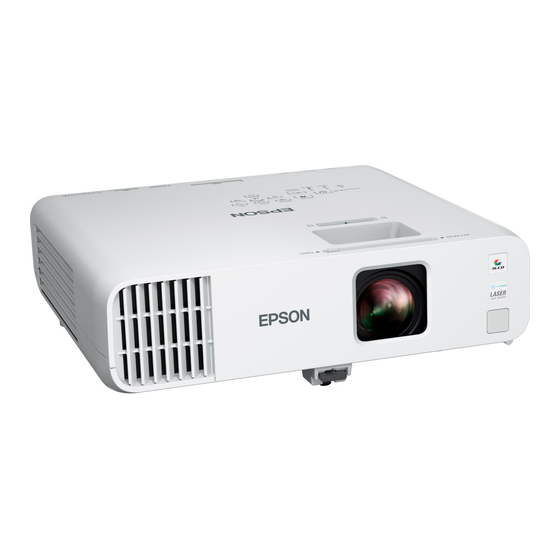Epson EB-L210W Impostazione rapida
Sfoglia online o scarica il pdf Impostazione rapida per Proiettore Epson EB-L210W. Epson EB-L210W 4.

EB-L210W/EB-L260F/EB-L265F
Quick Setup
IMPORTANT: Before using the projector, make sure you read these instructions
and the safety instructions in the online User's Guide.
Note: Product availability varies by country and region.
Note: The illustrations show the EB-L210W model, but the steps are the same
for all models, unless otherwise specified.
Connect the projector
Computer
Choose from the following connections. See the sections below or the online
User's Guide for details.
HDMI port
Connect one end of an HDMI cable to one of the projector's HDMI ports and
the other end to an HDMI port on your computer.
Computer port
Connect one end of a VGA cable to one of the projector's Computer ports, and
the other end to your computer's
switch it to external display (see "Troubleshooting"). You can also connect an
audio cable.
Note: To use the projector's Computer2 port, change the Monitor Out Port
setting in the Signal I/O menu. See the online User's Guide for details.
USB port
Connect the square end of a USB cable to the projector's USB-B (square) port.
Connect the flat end of the cable to any USB port on your computer.
Windows
7 or later: After turning on the projector, follow the on-screen
®
instructions to install the Epson
USB Display software (EMP_UDSE.EXE; only
®
on first connection). If the software screen does not display automatically, open
My Computer, Computer, or This PC, then double-click EPSON_PJ_UD.
OS X 10.8.x or higher: After turning on the projector, the setup folder for
USB Display appears in the Finder. Double-click USB Display Installer and
follow the on-screen instructions to install the Epson USB Display software
(only on first connection). If the software screen does not display automatically,
double-click EPSON_PJ_UD, then double-click USB Display Installer.
Screen mirroring
You can use Miracast
to send images to your projector from supported
®
smartphones, tablets, and laptops. See the online User's Guide for details.
External monitor and speakers
You can connect an external monitor and external speakers to your projector to
enhance your presentations. See the online User's Guide for details.
Wired network
Connect the projector to your network using an Ethernet cable. See "Wired
network configuration" for more information.
HDMI cable
VGA cable
USB cable
monitor port. If you are using a laptop,
Ethernet cable
Microphone (EB-L210W/EB-L260F)
Connect a dynamic microphone to the Mic port, using a 3.5 mm mini-jack cable.
Video device
Connect multiple video devices and use the Source Search button on the
projector or remote control to switch between them. For more information on
playing sound through the projector, see the online User's Guide.
Note: If you are connecting a streaming device, you can also connect it to the
projector's USB-A (flat) port for power.
Camera, USB device, or document camera
Connect a digital camera, USB flash drive, USB storage device, or Epson DC-07
document camera to the projector's USB-A (flat) port.
If you connect a digital camera, USB flash drive, or USB storage device, you can
use the projector's PC Free feature. You can also connect other Epson document
cameras to the projector. See the online User's Guide for details.
Using the remote control
Install the two AA batteries as shown.
Turn projector on
and off
Access projector menus
Turn off projector
display and sound
For more information on using the remote control, see the online User's Guide.
3.5 mm mini-jack cable
RCA video cable
(composite video)
HDMI cable
Component video
to VGA cable
3.5 mm audio cable
USB cable
Choose which source
to display
Navigate projector
menus
Control projector
volume
Access the Home
screen
